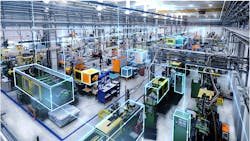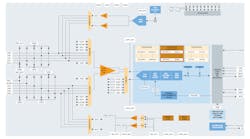Flexible Analog ICs to Drive Software-Defined Factories
Check out more of coverage of Electronica 2022.
NXP has landed industrial equipment giant Schneider Electric as a customer for its new family of analog front-end (AFE) ICs for high-precision data-acquisition and condition-monitoring systems in factories.
Featuring software-configurable universal analog inputs, the new N-AFE family combines a highly flexible analog front-end architecture with the accuracy, precision, and speed required for modern factories. NXP said the software-configurable features would help open the door to a new era of smart factories, giving companies the ability to quickly reconfigure robots and other equipment and adjust settings based on shifting market needs.
As automation alters the way everything from factory floors to power plants operate, manufacturers are using software to make it easier for workers to keep their distance and monitor and fix issues preemptively.
They’re also using software, paired with sensors and artificial intelligence (AI), to continuously assess and upgrade the robots and other machinery on factory floors over time, said NXP. The use of software also will enable companies to run diagnostics and then fix equipment before failures shut down factories. This not only promises to improve productivity, but it reduces the cost as well as the time it takes to upgrade factory operations.
“Software-defined factories are the next evolution of the Industry 4.0,” said Jens Hinrichsen, Executive VP and GM of Advanced Analog at NXP, which introduced the N-AFE family at the Electronica conference this week.
The N-AFE family integrates up to eight universal analog inputs that can be configured for a wide range of inputs, including voltage, current, resistance, and others, in a single chip. In turn, it reduces costs at the system level for data-acquisition equipment in factory and process automation. According to NXP, the family also brings a wealth of signal-chain protection, precision amplification, high-speed data converters, and filters into the fold.
The Essential Industrial AFE
The AFE is one of the critical building blocks of modern factory equipment, which are increasingly rife with sensors to identify potential malfunctions in machinery before it wears out. The sensors also relay data to the cloud for other purposes, such as building digital twins. These types of chips are used to convert and condition the analog signals from sensors so that they can be used by MCUs at the heart of the system.
It integrates advanced diagnostics to reduce factory downtime when paired with predictive maintenance and anomaly detection, while its factory calibration and self-calibration features help to reduce testing cost.
NXP said it would sell the new silicon to a wide range of traditional industrial equipment vendors. The company has worked closely with Schneider Electric to integrate the N-AFE family in a new generation of industrial gear.
Ralf Neubert, VP of Research and Development in Schneider Electric’s Digital Factory unit, said the new family of analog ICs “enables flexibility in our designs to allow our customers to quickly respond to market trends, but more importantly, it also helps to reduce unplanned downtime, enabling a more productive factory overall.”
NXP and its rivals in the semiconductor industry are getting more serious about the industrial IoT segment, rolling out new families of rugged chips that are specifically designed to power digital factories in the future.
With an industrial-grade temperature rating of −40 to 125°C, the chips are designed to be combined with NXP’s high-end MCUs and power-management ICs to help simplify the development of industrial systems.
The first chips in the N-AFE family, the high-speed NAFE71388 and low-power NAFE11388 with 24 or 16 bits of resolution, all feature the same 64-pin 9- × 9- × 0.85-mm HVQFN package and pin-to-pin compatibility.
About the Author
James Morra
Senior Editor
James Morra is the senior editor for Electronic Design, covering the semiconductor industry and new technology trends, with a focus on power electronics and power management. He also reports on the business behind electrical engineering, including the electronics supply chain. He joined Electronic Design in 2015 and is based in Chicago, Illinois.


